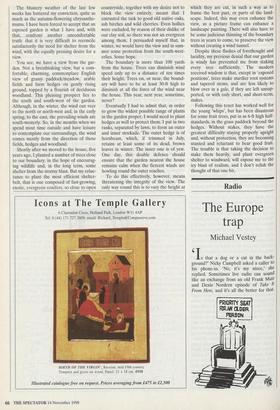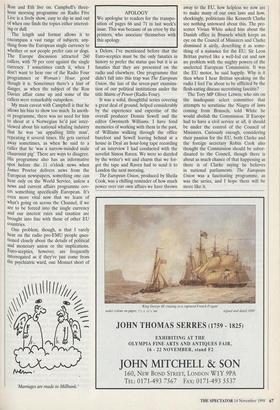Radio
The Europe trap
Michael Vestey
Is that a dog or a cat in the back- ground?' Nicky Campbell asked a caller to his phone-in. 'No, it's my niece,' she replied. Sometimes live radio can sound like an exchange from an old Frank Muir and Denis Nordem episode of Take It From Here, and it's all the better for that. Ron and Eth live on. Campbell's three- hour morning programme on Radio Five Live is a lively show, easy to dip in and out of when one finds the topics either interest- ing or dull.
The length and format allows it to encompass a vast range of subjects; any- thing from the European single currency to whether or not people prefer cats or dogs. The Europe discussion attracted 260 callers, with 70 per cent against the single currency. I sometimes catch it, when I don't want to hear one of the Radio Four programmes or Woman's Hour, good though it is. Sometimes there's a hint of danger, as when the subject of the Ron Davies affair came up and some of the callers were remarkably outspoken.
My main caveat with Campbell is that he allows his bias to show too much. In anoth- er programme, there was no need for him to shout at a Norwegian he'd just inter- viewed about his national whaling industry that he was 'an appalling little man', repeating it several times. He gets carried away sometimes, as when he said to a caller that he 'was a narrow-minded male chauvinist pig'. There are ways to disagree. His programme also has an informative spot before the 11 o'clock news when James Proctor delivers news from the European newspapers, something one can hear only on the World Service, unless a news and current affairs programme cov- ers something specifically European. It's even more vital now that we learn of what's going on across the Channel, if we are to be forced into the single currency and our interest rates and taxation are brought into line with those of other EU countries.
One problem, though, is that I rarely hear on the radio pro-EMU people ques- tioned closely about the details of political and monetary union or the implications. Euro-sceptics, however, are frequently interrogated as if they've just come from the psychiatric ward, one Monnet short of `Marriages are made in Millbank.' a Delors. I've mentioned before that the Euro-sceptics must be the only fanatics in history to prefer the status quo but it is as fanatics that they are presented on the radio and elsewhere. One programme that didn't fall into this trap was The European Union, the last of the seven-part examina- tion of our political institutions under the title Matrix of Power (Radio Four).
It was a solid, thoughtful series covering a great deal of ground, helped considerably by the experience and expertise of the overall producer Dennis Sewell and the editor Gwynneth Williams. I have fond memories of working with them in the past, of Williams walking through the office barefoot and Sewell leaving behind at a house in Deal an hour-long tape recording of an interview I had conducted with the novelist Simon Raven. We were so dazzled by the writer's wit and charm that we for- got the tape and Raven had to send it to London the next morning.
The European Union, produced by Sheila Cook, was a chilling reminder of how much power over our own affairs we have thrown away to the EU, how helpless we now are to make many of our own laws and how, shockingly, politicians like Kenneth Clarke see nothing untoward about this. The pre- senter Vivian White asked him about the Danish office in Brussels which keeps an eye on the Council of Ministers and Clarke dismissed it airily, describing it as some- thing of a nuisance for the EU. Sir Leon Brittan purred like a well-fed cat and saw no problem with the mighty powers of the unelected European Commission. It was the EU motor, he said happily. Why is it then when I hear Brittan speaking on the radio I feel I'm about to be afflicted by the flesh-eating disease necrotising fasciitis?
The Tory MP Oliver Letwin, who sits on the inadequate select committee that attempts to scrutinise the Niagra of laws coming from Brussels, told White he would abolish the Commission. If Europe had to have a civil service at all, it should be under the control of the Council of Ministers. Curiously enough, considering their passion for the EU, both Clarke and the foreign secretary Robin Cook also thought the Commission should be subor- dinated to the Council, though there is about as much chance of that happening as there is of Clarke saying he believes in national parliaments. The European Union was a fascinating programme, as was the series, and I hope there will be more like it.



















































































 Previous page
Previous page